Related Research Articles
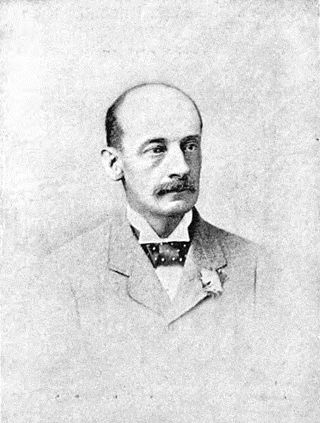
William Edward Norris was a London-born English fiction and writer. His first story, Heap of Money, appeared in 1877, and was followed by a long series of novels and stories, many of which first appeared in the Temple Bar and Cornhill magazines.

Admiral of the Fleet Sir Arthur Knyvet Wilson, 3rd Baronet, was a Royal Navy officer. He served in the Anglo-Egyptian War and then the Mahdist War being awarded the Victoria Cross during the Battle of El Teb in February 1884. He went on to command a battleship, the torpedo school HMS Vernon and then another battleship before taking charge of the Experimental Torpedo Squadron. He later commanded the Channel Fleet. He briefly served as First Sea Lord but in that role he "was abrasive, inarticulate, and autocratic" and was really only selected as Admiral Fisher's successor because he was a supporter of Fisher's reforms. Wilson survived for even less time than was intended by the stop-gap nature of his appointment because of his opposition to the establishment of a Naval Staff. Appointed an advisor at the start of World War I, he advocated offensive schemes in the North Sea including the capture of Heligoland and was an early proponent of the development and use of submarines in the Royal Navy.
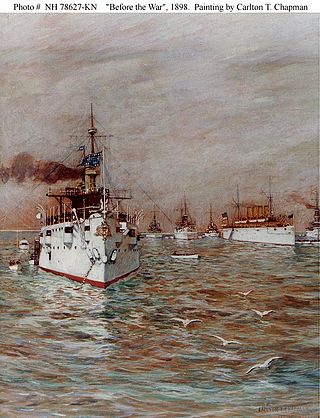
The North Atlantic Squadron was a section of the United States Navy operating in the North Atlantic. It was renamed as the North Atlantic Fleet in 1902. In 1905 the European and South Atlantic squadrons were abolished and absorbed into the North Atlantic Fleet. On 1 January 1906, the Navy's Atlantic Fleet was established by combining the North Atlantic Fleet with the South Atlantic Squadron.

Admiral of the Fleet Sir Henry Bradwardine Jackson, was a British Royal Navy officer. After serving in the Anglo-Zulu War he established an early reputation as a pioneer of ship-to-ship wireless technology. Later he became the first person to achieve ship-to-ship wireless communications and demonstrated continuous communication with another vessel up to three miles away. He went on to be Third Sea Lord and Controller of the Navy, then Director of the Royal Naval War College and subsequently Chief of the Admiralty War Staff. He was advisor on overseas expeditions planning attacks on Germany's colonial possessions at the start of the First World War and was selected as the surprise successor to Admiral Lord Fisher upon the latter's spectacular resignation in May 1915 following the failure of the Gallipoli Campaign. He had a cordial working relationship with First Lord of the Admiralty Arthur Balfour, but largely concerned himself with administrative matters and his prestige suffered when German destroyers appeared in the Channel, as a result of which he was replaced in December 1916.

Rowland Edmund Prothero, 1st Baron Ernle, was a British agricultural expert, administrator, journalist, author and Conservative politician. He played first-class cricket between 1875 and 1883.
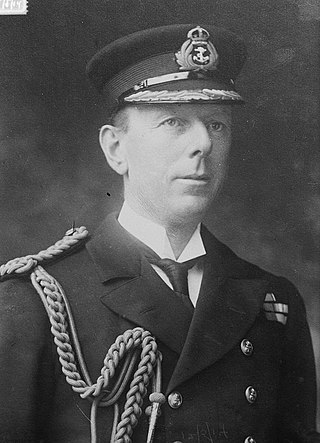
Admiral Sir Stanley Cecil James Colville, was a senior Royal Navy officer.

Admiral of the Fleet Sir Gerard Henry Uctred Noel, was a Royal Navy officer. As a junior officer he commanded a naval brigade which took part in the capture of Kumasi in February 1874 during the Second Anglo-Ashanti War.

Sir Henry Frederick Stephenson was a Royal Navy officer, courtier, and Arctic explorer.

Cook, Welton & Gemmell was a shipbuilder based in Hull and Beverley, East Riding of Yorkshire. England. They built trawlers and other small ships.

Admiral of the Fleet Sir Charles Frederick Hotham was a Royal Navy officer. As a junior officer, he was a member of the naval brigade that fought the Māori people at the Battle of Rangiriri during the invasion of the Waikato and was also present at the Battle of Gate Pā during the Tauranga Campaign. He later took part in the bombardment of Alexandria during the Anglo-Egyptian War and then went ashore as Chief of Staff of the naval brigade, formed under Admiral Sir Beauchamp Seymour, which was dispatched to restore the authority of Khedive Tewfik Pasha in the face of Ahmed ‘Urabi's nationalist uprising against the administration.
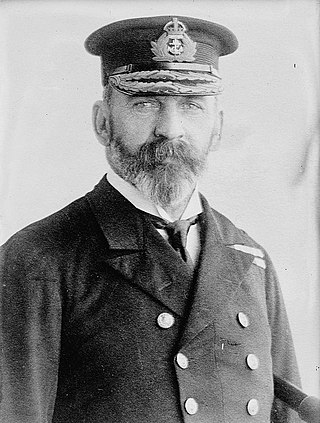
Admiral Sir Arthur William Moore, was a Royal Navy officer who became both Commander-in-Chief, China and Commander-in-Chief, Portsmouth.

Admiral of the Fleet Sir Arthur Dalrymple Fanshawe, was a Royal Navy officer. As a captain he became commanding officer, successively, of the troopships HMS Jumna and HMS Malabar, which were tasked with ferrying troops between the United Kingdom and India. These were difficult commands with regular disputes between the military officers in charge of the troops and the naval officers in command of the ships.

Admiral of the Fleet Sir James Elphinstone Erskine, was a Royal Navy officer. As a junior officer he served on the North America and West Indies Station. This was a difficult time in relations between the United Kingdom and the United States following the Trent Affair, an international diplomatic incident that occurred during the American Civil War when the United States Navy frigate USS San Jacinto intercepted the British mail packet RMS Trent.
Admiral Sir George Lambart Atkinson-Willes, was a Royal Navy officer who went on to be Commander-in-Chief, East Indies Station.
Admiral Cecil Spencer Hickley, was a career Royal Navy officer who finished as a vice-admiral, promoted to full admiral in retirement in 1925. He also played first-class cricket for Western Province in South Africa in 1890/91 and for Somerset in 1898 and 1899. He was born at Ashcott, Somerset and died in London.
Admiral Atwell Peregrine MacLeod Lake was a Royal Navy officer who became Senior Officer, Coast of Ireland Station.

Vice Admiral James Lacon Hammet CVO was a Royal Navy officer who became Admiral Superintendent of Malta Dockyard.

Admiral John Harvey Rainier was a Royal Navy officer. He had the unusual distinction of commanding troops from six different nations in action.
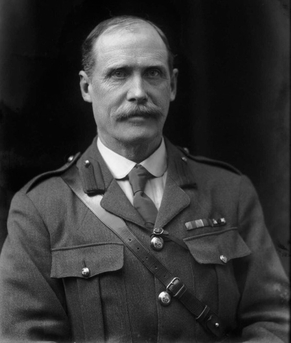
Vice-Admiral Gerald Charles Adolphe Marescaux was a Royal Navy and British Army officer. Having joined the navy in 1873, Marescaux spent the majority of his time as a junior officer serving on surveying duties. Promoted to commander in 1896, he served as captain of ships undergoing trials at Sheerness until 1900. He was promoted to captain in 1903 and held commands at home and on the China Station before, in 1910, he took command of the North of Ireland Coastguard. In 1913 he was made King's Harbour Master, Portland, and promoted to rear-admiral.
References
- ↑ "Admiral Prothero" (Obituaries)", The Times, 3 January 1931, , p. 12.
- 1 2 3 4 "ADM 196/39/355". The National Archives.
- ↑ The London Gazette: no. 25604. p. 3189. 2 July, 1886.
- ↑ The London Gazette: no. 26359. p. 2. 2 January, 1893.
- ↑ "Naval & Military Intelligence" (Official Appointments and Notices), The Times, 14 July, 1902, page 7
- ↑ The London Gazette: no. 27818. p. 4983. 18 July, 1905.
- ↑ The London Gazette: no. 28201. p. 9182. 1 December, 1908.
- ↑ The London Gazette: no. 28703. p. 2159. 21 March, 1913.